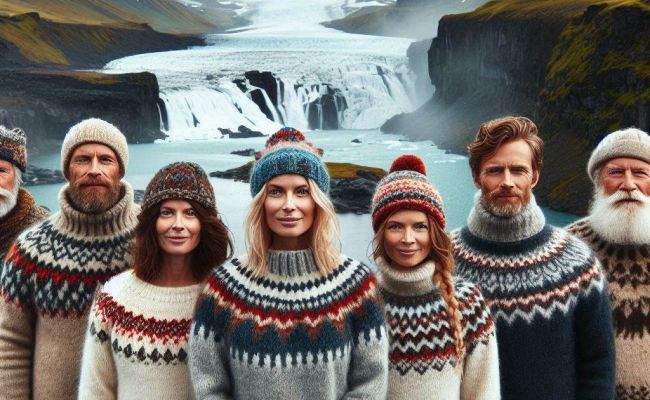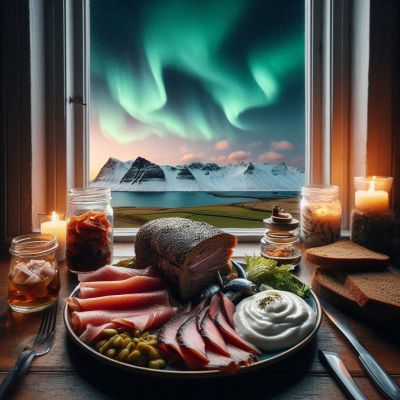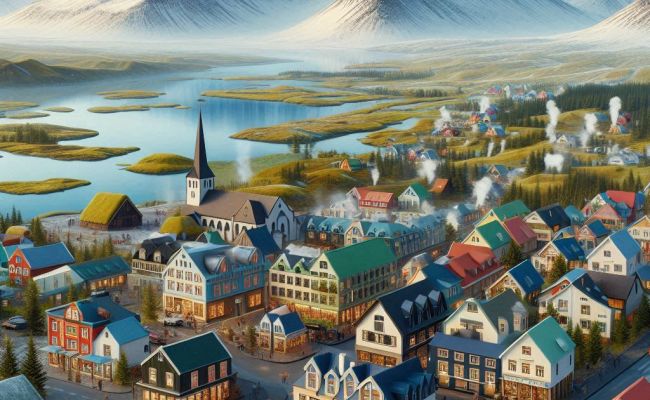Iceland, a North Atlantic island nation, is noted for its stunning landscapes, which include volcanic mountains, geysers, hot springs, and glaciers. Iceland’s location on the Mid-Atlantic Ridge contributes to its steep topography and unique geological features.
Iceland’s population embraces both modern innovation and deep cultural traditions, and the country has a strong commitment to environmental sustainability as well as a lively cultural scene. The country is also known for its folklore, which includes stories about elves and trolls, as well as its vibrant cultural scene.
Culture
Icelandic culture’s language, literature, and traditions deeply reflect its Norwegian heritage. Icelandic, a heavily inflected North Germanic, is the dominant language, with a significant focus on linguistic purity to retain its roots. Traditional dishes include orramatur, gravlax, hangikjöt, and skyr.

Iceland’s history of Christianization, ranging from Norse Paganism to Lutheranism, has impacted its religious landscape, with most of the population nominally Lutheran. The country has a long literary legacy, with notable contributors including Snorri Sturluson and Halldór Laxness. Icelanders have a strong connection to their natural surroundings, with geothermal pools and volcanic landscapes playing an important role in daily life and recreation.
Iceland places high importance on the arts, notably literature and music, and has produced prominent artists in a variety of professions, such as Nobel Prize-winning novelist Halldór Laxness, chess champion Bobby Fischer, and musician Vladimir Ashkenazy.
People
Notable early Icelanders include Leif Erikson, who discovered North America in 1000 AD, and statesmen Bishop Jón Arason and Jón Sigurðsson, who advocated for Icelandic autonomy. Vigdís Finnbogadóttir was the first female president of a republic, serving from 1980-1996.
Some notable writers are Ari Þorgilsson, Snorri Sturluson (Prose Edda), and Hallgrímur Pétursson (Passion Hymns). Key poets included Bjarni Thorarensen, Jónas Hallgrímsson, Matthías Jochumsson (national anthem), Þorsteinn Erlingsson, Einar Hjörleifsson Kvaran, Einar Benediktsson, Jóhann Sigurjónsson, and Nobel Prize winner Halldór Laxness.
Stefán Stefánsson was a pioneering botanist, while Helgi Pjeturss was a renowned geologist and philosopher. Chess champion Bobby Fischer and pianist Vladimir Ashkenazy became Icelandic citizens in 2005 and 1972, respectively.
Religion
During the ninth century AD, the Norse settlers in Iceland practiced Norse Paganism as their primary religion. Christianity was introduced in approximately 1000 AD. During the mid-16th century Icelandic Reformation, the Danish crown established Lutheranism as the state religion. This Christianization process culminated during the Pietist era, which opposed non-Christian practices.
Today, the majority of Icelanders are nominally Lutheran (75.4% in 2017). They also follow other Christian denominations like Catholicism and Mormonism. Iceland is home to followers of Islam, Judaism, and folk religions such as satrfélagi.
Language
Iceland’s major language is Icelandic, a North Germanic language with complicated inflection. The school curriculum also includes Danish and English. Iceland aggressively advocates linguistic purity, attempting to prevent foreign words from entering the language. Instead of adopting loanwords, Icelandic generates new words from existing roots, resulting in compound words for new concepts.
For instance, Icelandic derives the word “tölva,” meaning “computer,” from the archaic meanings “number” and “seer.” Furthermore, newer conceptions often give ancient, useless words new meanings.
Cuisine
Icelandic cuisine features a diverse range of traditional meals, particularly during the ancient Nordic month of Orri in January and February. This time offers Orramatur, a collection of delicacies that pay tribute to traditional Icelandic culture. Orramatur comprises offal delicacies such as hartspungar (pickled ram’s testicles), putrefied shark, singed sheep skulls and jam, black pudding, liver sausage (akin to Scottish haggis), and dried fish like cod or haddock.

The fishing sector plays a significant role in Iceland’s traditional cuisine. Gravlax (smoked salmon marinated in salt and dill), hangikjöt (smoked lamb), and slátur (sausage prepared from sheep guts) are all popular meals. Cultured skim milk is the source of Skyr, a popular dairy product. Furthermore, Brennivin is a traditional Icelandic liquor produced from potatoes and flavored with caraway.
